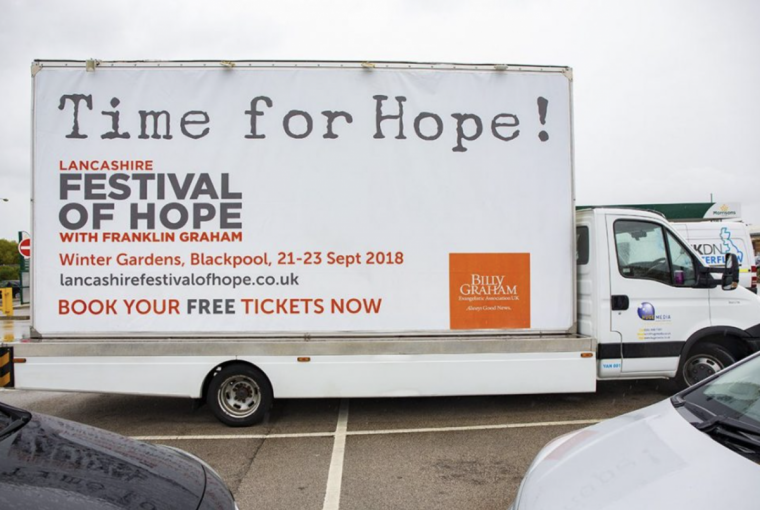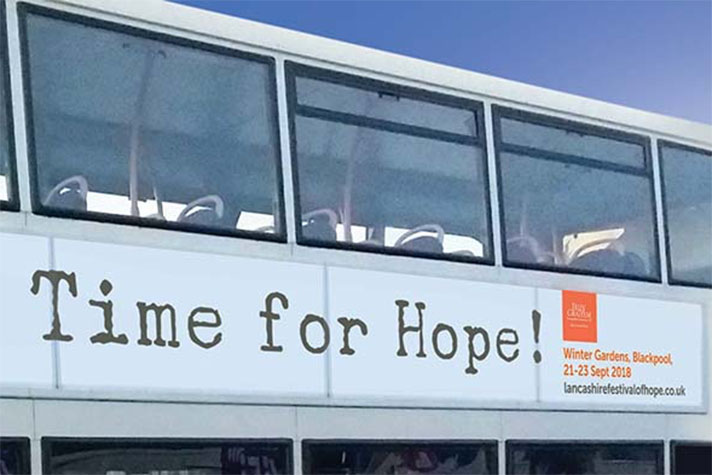Franklin Graham's views on marriage cannot be characterised as 'extremist', says court

Blackpool Borough Council and Blackpool Transport Services discriminated against Christians when they removed bus adverts for an event with US evangelist Franklin Graham, a court has ruled.
The adverts ran on local buses to promote the 2018 Lancashire Festival of Hope with Graham, the son of late evangelist Billy Graham.
They displayed only details of the event and the slogan "Time for Hope", but were removed after a social media campaign by LGBT activists.
But the court has now sided with organisers the Billy Graham Evangelistic Association (BGEA UK).
In a judgment handed down on Thursday, Judge Claire Evans said the removal of the ads over Graham's religious views on marriage was a violation of the Equality Act 2010, and an unjustified interference in the organisers' freedom of expression.
The judge also concluded that a secular organisation advertising "in exactly the same way ... would not have had its advertisements removed".
Elsewhere, the judgment said that Graham's views were shared by many religions.
"They may be offensive to some people, but they cannot properly be characterised as 'extremist'," it said.
Judge Evans ruled "overwhelmingly in favour" of the Lancashire Festival of Hope, saying Blackpool "had a wholesale disregard" for the event's right to freedom of expression while simultaneously giving preference to the rights and opinions of the LGBT community.

BGEA UK said Thursday's ruling was a "strong and clear rebuke of the cancel culture sweeping the UK".
"We thank God for this ruling because it is a win for every Christian in the UK," said Graham.
James Barrett, Chairman of BGEA UK, said: "This ruling confirms that all Christians in the UK have the right to share their beliefs in the public square without being discriminated against or interfered with by public officials and other groups that want to silence them.
"I am grateful the courts have once again reiterated that the freedom to speak only what is not offensive is not freedom of speech at all."
Some 9,000 people attended the Lancashire Festival of Hope in Blackpool in September 2018, with more than 50,000 watching online.
Welcoming the judgment, Simon Calvert, Deputy Director for Public Affairs at The Christian Institute, said the ruling safeguards future evangelistic events in the UK.
"This ruling is good news for the Good News. Lancashire Festival of Hope was an entirely positive presentation of the gospel and had nothing to do with the controversies activists tried to link to it," he said.
"Evangelistic events like this can go ahead in the future safe from hostile attempts by local councils to mute their message.
"This ruling is a warning to local authorities who don't like Christians because of their beliefs about marriage. The message is clear: if you discriminate against us, you are breaking the law.
"The Festival's bus adverts were agreed by all sides to be inoffensive. Yet Blackpool banned them, then lit up the Tower in rainbow colours during the Festival to show their solidarity with LGBT activists and their opposition to Christians.
"The judgment strongly condemns Blackpool's actions, and rejects the arguments of their legal team that sought to defeat the entire purpose of equality and human rights law."











